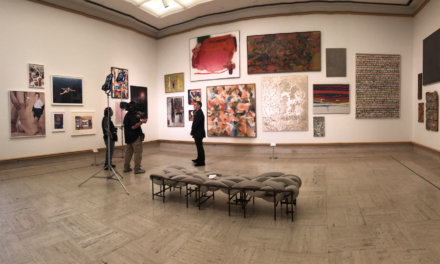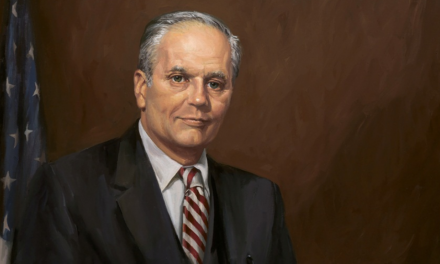Leading up to the Aug. 2, 2022 primary election, as the race for Michigan’s congressional seats heats up, which candidates will voters choose to represent Michigan for the next two years? When voting at the polls this year, voters have to choose from a crowded field of candidates from each of their districts to fill now only 13 congressional seats, rather than the previous 14 seats, after the approval of new redistricting maps this year.
RELATED: Michigan’s New Redistricting Maps Change Election Races, Face Legal Challenges
RELATED: The Race for Michigan Governor: Which Republican Candidate Will Win the 2022 Primary Election?
One Detroit contributors Stephen Henderson, host of “American Black Journal,” and Nolan Finley, editorial page editor at The Detroit News, come together for a lively conversation about the candidates running in the upcoming Michigan congressional election, the Districts with the closest races to be decided, whether or not Michigan will have an African American representative in Congress, and the hot-button issues voters that may motivate voters to visit the polls.
Plus, they debate what’s at stake for the state depending on the possible outcomes of the Michigan congressional election.
Full Transcript:
Stephen Henderson, One Detroit Host: All right, Nolan, it’s next week. The August 2nd primary, where we’ll make big decisions in Congress and in the state house. And there are a couple of barnburners still really raging out there.
Stephen Henderson: Let’s start with the 13th Congressional District, which is the new district, one of the new districts in the city of Detroit. Nine candidates. Shri Thanedar, Portia Roberson, Adam Hollier, Sherry Gay Dagnogo, Sharon McPhail. I mean lots of big names in that one.
Nolan Finley: A lot of big names which you know, gives an advantage to Shri Thanedar, the state representative who’s spending $5 million dollars of his own money to go to Congress. And the polls show that’s paying off, that he is the front runner in that race.
Nolan Finley: Followed rather closely by Portia Roberson and Adam Hollier, who are making a good run for that. But the significance of this race is that it’s the best chance or perhaps the only chance to send an African American Democrat to Congress and to get an African American congressional representative from Detroit. It’s been a long time since…
Stephen Henderson: 1955
Nolan Finley: Right
Nolan Finley: I mean, that’s a pretty remarkable shift. But if things play out the way they appear to be playing out, that won’t be the case. And the only I mean, maybe Michigan’s delegation either has no African-American members or a Republican. And John James, who’s running in the 10th District, no guarantee he’ll win there.
Stephen Henderson: Yeah, I mean. Well, I mean, the problem is actually has nothing to do with the way that district is drawn. It’s the number of African-Americans from the city who decided they wanted to take a shot at it.
Nolan Finley: Right.
Stephen Henderson: They will clearly outpoll Shri Thanedar on Election Day together. But individually they may not be able to come up with the votes.
Nolan Finley: But let’s move over to the 11th District, where you have two incumbent Congress members running against each other and Haley Stevens and Andy Levin. You look on the paper, I have two Democrats, two progressives, but they’re really quite different.
Nolan Finley: I mean, Andy Levin aspires to be a member of the squad. Haley Stevens describes herself as a pro-business Democrat.
Nolan Finley: Now, neither one of them are moderates. But if you look at that district, it would seem that someone who comes from a business point of view and a more moderate, slightly more moderate point of view would have the edge there. And I think that’s what the polls are suggesting in Haley Stevens.
Stephen Henderson: I think the truth is that neither of them really represents the way that district was drawn. And I think what you could see is one of them win it this term, but in two years face a really stiff challenge from somebody who would not have gotten in it this year because you had two incumbents in the race. But I’m surprised at how ugly this race has gotten.
Nolan Finley: When you put two incumbents together it always gets ugly. It always gets nasty because they both are just holded to these jobs. I’ve seen it play out this way any time it’s happened in Michigan.
Nolan Finley: Let’s go all the way over to the third district in the Grand Rapids area, where Democrats are spending a lot of money to promote a Trump-backed candidate. And John Gibbs, who’s primary who’s making a primary challenge to Peter Meijer.
Nolan Finley: And they’ve done this in other places in the country, trying to get the Trump candidate on the ballot in hopes that he’ll be easier to beat in the general election. Sort of a sleazy move. But politics is a sleazy business.
Stephen Henderson: It’s kind of par for the course. But here, there’s a little bit of a, an individual miscalculation in that district, you know, I mean, Peter Meijer. Yeah, he’s a Republican, but you certainly would favor him if you are a Democrat over the primary opponent that he has.
And there’s no guarantee that the Democrats who even though they’re going to have a good candidate, can win that district, is not really drawn too much to their favor. I think over time, maybe they hope that because it’s a more centralized district than the one that they had before, that maybe they can but I don’t think this is the year to be playing that game now.
Nolan Finley: I think Peter Meijer will keep this seat. I think once he’s through the primary, Republicans will flood that district with money because it’s districts like these that are key to them winning the majority.
Nolan Finley: We had an interesting piece last week in the Detroit News about the redistricting commission itself. And the chairman of the commission saying, you know, look, I was pressured by our attorneys to the number of Black voters in these districts that she didn’t want to get accused of backing, but in doing so, made it a lot harder. In both legislative races and congressional races, to get Black candidates elected, particularly around the city of Detroit.
Stephen Henderson: What you have are districts that try to create, you know, common communities of interest across municipal and community boundaries. That’s always a risk, but it’s a smart risk. And one of the reasons that it makes sense is the number of African-Americans who have moved out of the city and now live especially and close in suburbs.
If you look at all of those districts, they have enough African-Americans in them, according to the numbers. Forty percent and above is really what you’re looking at to be able to elect an African-American. The question is whether they will elect African-Americans from the city or eventually whether they will turn to African-Americans from the suburbs.
I always say that the most instructive example here is, is the district that Brenda Lawrence now represents, which went away. But the idea that she is an African American from Southfield, was able to beat African-Americans, in some cases from the city. For that seat, it’s a harbinger of the future in this region.
Nolan Finley: It’s been decades since we haven’t had a Black senator from Detroit in the state Senate. I don’t think this is a good outcome of that whole redistricting effort.
Stephen Henderson: Yeah, it’s not a good outcome. It is a logical outcome of the shifting demographics. And this is the first election under this map. I think elections three through five really are the ones that tell you what you really have. I don’t think it is a bad map. I think it is a map that, you know, has a bad transition potentially that comes with it. But we’ll see in a few days.
Nolan Finley: Well, let’s get out and vote Tuesday, Steve.
Stephen Henderson: Yes, everybody go out and vote or you can sit at home and vote now if you want to vote absentee. No reason. Absentee voting. One of the wonderful changes we’ve made here in Michigan.
Stay Connected:
Subscribe to One Detroit’s YouTube Channel & Don’t miss One Detroit Mondays and Thursdays at 7:30 p.m. on Detroit Public TV, WTVS-Channel 56.
Catch the daily conversations on our website, Facebook, Twitter @DPTVOneDetroit, and Instagram @One.Detroit
View Past Episodes >
Watch One Detroit every Monday and Thursday at 7:30 p.m. ET on Detroit Public TV on Detroit Public TV, WTVS-Channel 56.




